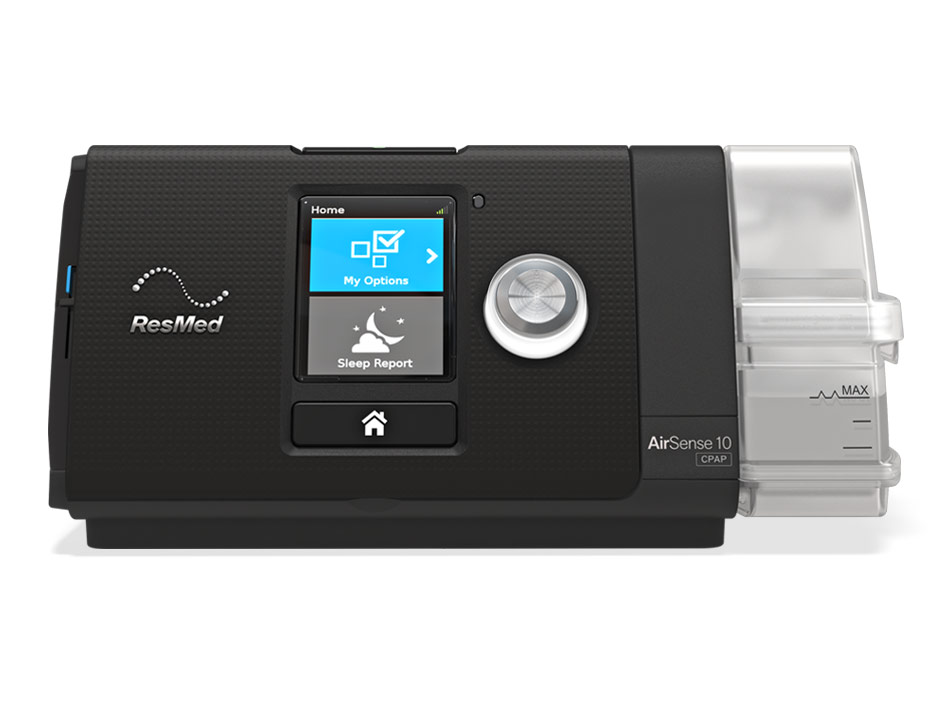What is a CPAP Machine

A CPAP machine is a respiratory device that eliminates the effects of sleep apnea during sleep. Apnea is Greek for “without breath”. This is better known as loss of breathing during sleep.
The airway becomes restricted due to the collapse of soft tissues in the throat. The loss of oxygen in the bloodstream causes the brain to respond by a gasp for air, that awakens the body from the sleep cycle.
Repeated events like this cause daytime fatigue and is a contributing factor to many health problems like high blood pressure, impotence, drug/alcohol dependence, heart failure, and even death. Going untreated, a sleep apnea patient can lose the quality of life in 6 months or less.
A CPAP machine is a simple solution that uses an air flow generator, that forces the airway of the patient to stay open, so breathing can occur. Normal breathing can only happen when the airway is un-obstructed. A CPAP machine provides air pressure through a hose and mask system to keep the airway open and allow the normal sleep cycles to occur.
CPAP Therapy
CPAP therapy is used for OSA (obstructive sleep apnea), central sleep apnea, and combined sleep apnea. A doctor will determine which CPAP variation is right for each individual patient.
An automatic titrating CPAP machine (APAP or AutoPAP) can be used to treat those who have sleep apnea and pressures that change from hour to hour or minute to minute.
A bi-level machine (BIPAP) can be used to treat severe sleep apnea patients. A BIPAP has a different pressure output for inhalation and exhalation. Severe CPAP patients need this type of technology to be able to exhale under higher pressure settings.
A new BIPAP machine costs about $1200 or more where a standard CPAP machine costs about $250. An
CPAP machines usually include the following:
- CPAP (Continuous Positive Airway Pressure) machine,
- 6 foot hose or tubing to deliver the air to the CPAP mask,
- Power cord that connects the CPAP unit to a power source
- Filter or filter(s) to protect the CPAP unit and user from dust, pollen, and other airborne particles. (Most CPAP machines have washable foam style filters with an option to add disposable ultra-fine filters. These are designed to remove the smallest particles and should be changed out monthly).
- Most CPAP systems come with a travel bag.
CPAP Masks
CPAP masks are usually sold separately than machines due to variations of size and options.
CPAP masks are offered in many different styles. Nasal masks cover the nose only, whereas a nasal pillow style CPAP mask delivers the air through small “cone shaped” pillows that rest on the edge of the nostrils. A full face CPAP mask allows the user to breathe from the nose or the mouth. These masks are often prescribed for patients who have problems keeping the mouth closed.
Other CPAP related accessories include humidifiers, heated humidifiers, special length tubing, 12 volt power cords, power inverters, fleece tubing covers, chin straps, hose management systems, and replacement items such as mask parts, headgear, filters, and humidifier chambers.

Patrick Mahinge
With over 10 years of experience in sleep health and consumer reviews, Patrick Mahinge helps you find the best mattresses, pillows, beds, and snoring aids through in-depth testing and expert analysis.
Related Articles

Best CPAP Machine for the Money- Reviews and Consumer Buying Guide
Read more about this article...
Read the Full Feature →